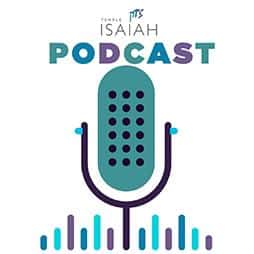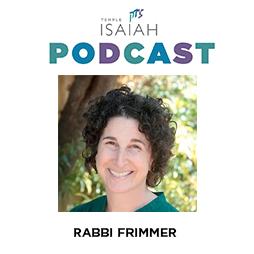Our Latest
Audios

HIGHLIGHTS FROM HARTMAN: POWER, MORALITY, NATIONALISM AND PEOPLEHOOD
Rabbis Frimmer and Timoner come together for one more conversation after an evening conversation with Tal Becker and Yossi Klein Halevi, Senior Fellows at the Shalom Hartman Institute in Jerusalem. How can Progressive Zionists use power in a world in which powerlessness is seen as more moral? How do we close the gap between Diaspora and Israeli Jews when it comes to radically different answers to the question, “What type of nation will keep the Jews safe?”

THE RIVER THAT RUNS BETWEEN US – PARASHAT MATOT
Rabbi Dara Frimmer – Friday Night Shabbat Sermon 5779 – Each time the Jewish people have entered the land of Israel, from ancient times until now, there is a turning point in our collective history and identity. There is an unintended rupture within the community of Clal Yisrael: If Israel is now our home, what do we call the land outside of Israel in which Jews live? If Peoplehood is reborn in the land, by what name do we call our People who live outside her borders? On this Shabbat, Rabbi Frimmer examines the creation of the first Diaspora Jewish community as 2.5 tribes ask for permission to plant their roots on the West Side of the Jordan River while the rest of the Israelites prepare to enter the Promised Land.

BIBLICAL WISDOM THAT INSPIRES OUR MODERN LIVES
Cantor Tifani Coyot – Friday Night Shabbat Sermon 5779 – Listen to the inspirational story of five biblical women known as Tzelafchad’s daughters. They act according to Jewish values: they speak out against injustice, teach us that Judaism must evolve, and preserve the legacy of their father.

JEWISH IDENTITY POLITICS: AT THE INTERSECTION OF POWERFUL + VULNERABLE
Rabbi Dara Frimmer and Rabbi Rachel Timoner discuss Jewish Identity Politics and the conflicting, and seemingly contradictory, experiences of being both vulnerable and powerful. How does the historical (and contemporary) Jewish experience of trauma and oppression as a minority group make us stronger allies in the fight for justice? How does our power/privilege complicate our efforts to join coalitions? Thanks to Dr. Mijal Bitton, Fellow in Residence and faculty member at Shalom Hartman Institute of North America, and the Rosh Kehilla and co-founder of the Downtown Minyan in New York City, for her lecture on this topic.

A CONVERSATION WITH CANTOR EVAN KENT
Rabbi Dara Frimmer and Temple Isaiah’s Emeritus Cantor, Evan Kent, sit down in Jerusalem for a pre-Shabbat talk about life-after-aliyah, Israeli politics, Jewish identity and (feral) cats. Thanks to everyone who shared their questions online.
Evan’s Website
SoundCloud Links: Hear Rabbi Josh Weinberg talk Israel election results from April 9, 2019:
Dara is going to Israel in January, 2020: templeisaiah.com/israel
The Clergy Suite podcast is produced by Michael Yanow | Theme music created by Edward Auslender of LA Music Lab

GERRYMANDERING PEOPLEHOOD: WHO’S IN AND WHO’S OUT
From an Airbnb kitchen in Jerusalem, Rabbi Frimmer shares a Clergy Suite conversation with her friend and colleague, Rabbi Rachel Timoner. Reflecting on the theme of Peoplehood and the recent teachings by Dr. Elana Stein Hain, Scholar in Residence and Director of Faculty at the Shalom Hartman Institute of North America, Rabbis Frimmer and Timoner discuss inclusion, opting-out, the necessity of rebuke and the power of loyalty and love.
The Clergy Suite podcast is produced by Michael Yanow | Theme music created by Edward Auslender of LA Music Lab

HOW’S YOUR HEART? SUMMER LOVING, LEAVING, AND LEARNING
The Clergy Suite’s final episode of Season 1 explores the simple and provocative question: How’s Your Heart? Taken from Omid Safi’s article, The Disease of Being Busy, Safi writes: In many Muslim cultures, when you want to ask them how they’re doing, you ask: in Arabic, Kayf haal-ik? or, in Persian, Haal-e shomaa chetoreh? In reality, we ask, “How is your heart doing at this very moment, at this breath?” Rabbis Frimmer, Klein Miles and Cohen reflect on the end of the year for Temple Isaiah (June 30) and the start of our next (July 1) with personal changes, losses, and challenges. They also give a sneak peak at the exciting programs in the year to come.

EPISODE 20 | EVERYTHING I NEEDED TO KNOW I LEARNED ON THE JOB
Rabbis Frimmer and Klein Miles discuss a provocative article from The New York Jewish Week, “20 Years In The Rabbinate: ‘They Didn’t Teach Me This In Rabbinical School’”, about the state of synagogues, rabbinic leadership and the ever-changing and challenging nature of Jewish communities. Tune in to hear what Isaiah clergy learned (and missed out on) in rabbinical school. Why do people join Isaiah? What do they expect from their clergy and community?
Years In The Rabbinate: ‘They Didn’t Teach Me This In Rabbinical School’ by Rabbi Elliot Cosgrove.

GUEST SPEAKER: RABBI RACHEL GRANT MEYER FROM HIAS
Rabbi Meyer delivers an inspiring and informative D’var Torah about the work of HIAS and the current crisis of policy, placement and discrimination facing refugees, asylum seekers, and immigrants. What is the Jewish-American response to fear? Who do we want to be? Q & A from the community follows.
Rabbi Meyer currently serves as Rabbi-in-Residence at HIAS, where she develops educational materials, resources, and programs that educate American Jews about refugee issues, connecting the plight of contemporary refugees to Jewish values and history. To learn more about HIAS, click here: www.hias.org

PARASHAT KEDOSHIM – THE HOLINESS CODE: REPROVE + REBUKE, THEN RETURN
Rabbi Dara Frimmer – Friday Night Shabbat Sermon 5779 – In the wake of missiles, op-eds, and Israel’s Independence Day, Rabbi Frimmer asks us to turn away from the headlines and look to Torah as our guide. The Holiness code instructs us to rebuke that which is wrong and the wrongdoers. At the same time, we cannot take vengeance or bear a grudge.
“This is the Holiness Code. It’s not a mirror. It’s not who we are right now. It’s a window, asking us to look out and see what we might aspire to be. At times, we are so far from the society described in the Torah. Still, we keep these verses close at hand. We read them once a year on Shabbat. We return to them during the Mincha service of Yom Kippur. They are the guiding words as we consider the start of a New Year – how do we hope to live? What society do we hope to create?
And it doesn’t say: when under attack, discard the code.”